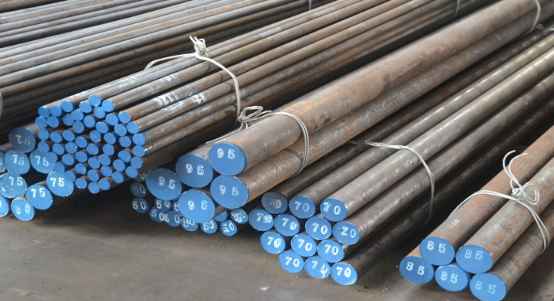EN24 steel has been a long-time favourite where the perfect combination of strength, toughness and wear resistance has been proven in challenging cases associated with the engineering processes. EN24 is already of the same note that it is known to have quite good mechanical properties, and as such it has been used in many different industries such as automotive, aircraft, manufacturing and general engineering.
Even though most people have now started referring to EN24 and EN24T interchangeably, it is important to point out here that EN24 is the complete phrase that describes the grade of steel, whereas EN24 T is the steel that is available in the tempered (T) condition. Nonetheless, the main snag on EN24 has been kept up, and this is a highly dependable and adaptive input in any industry.
What is EN24 Steel?
The specifically British Standard version of EN24 is the high-strength alloy steel that is cited in the BS 970. One of its other names is its contemporary name, 817M40. EN24 is an alloy which comprises nickel, chromium and molybdenum as the most important elements that contribute to strengthening. It is very finely balanced chemically to produce a blend of high tensile strength, good toughness and satisfactory fatigue strength.
A typical chemical breakdown of EN24 steel includes:
- Carbon: 0.36–0.44%.
- Nickel: 1.30–1.70%.
- Chromium: 0.90–1.40%.
- Molybdenum: 0.20–0.35%.
- Manganese, Silicon, and Sulphur in minute amounts.
Key Properties of EN24 Steel:
EN24 steel is renowned for its mechanical robustness. Its primary properties include:
- High Tensile Strength: It usually gives values of 850-1000 N/mm in case of quenched and tempered condition.
- Excellent toughness: Good impact resistance at low temperature.
- Good Wear Resistance: Suitable where friction and abrasion occur in service.
- Satisfactory Machinability: EN24 is strong, however, with the right tooling it can be machined.
- Hardening Capability: It can be used in hardening of surfaces such as through induction hardening or nitriding.
- Excellent Fatigue Strength: Capable of being subjected to repeated loads and is therefore applicable to rotating parts.
Typical Applications of EN24 Steel:
EN24’s unique blend of strength and toughness makes it a preferred material for numerous critical applications. Common uses include:
- Transmission Shafts and Crankshafts: High-load rotating parts.
- Gears And Gear Shafts: Common in Automotive, and also In Machines.
- Heavy Duty Bolts and Studs: For structural engineering, and Mechanical Assembly.
- Couplings and spindles: Both in the precision machinery and equipment.
- High-Strength Fasteners: In automotive, marine, and aerospace industries.
- Die and Mould Tooling: For plastic injection and metal forming.
Difference Between EN24 and EN24T:
Where the designation EN24 refers to the grade of the steel, EN24T shows that the material is supplied in the tempered condition, i.e. the material is quenched and tempered to give it its mechanical properties. EN24, in its untreated form, may need heating before use, depending on the strength and toughness needed in the application.
EN24 in the T condition (EN24T) is the most common stockist-supplied EN24 product in the UK, as it offers the best compromise of strength and machining properties useful in general engineering situations. Nevertheless, specific uses can require special heat treatment, and it is in normalised or annealed EN24 that a further working form is chosen.
Machinability and Fabrication Considerations:
EN24, being an alloy-based steel, is more difficult to machine relative to mild steels, although this is still regarded as manageable by most, using the correct methods and tooling. Machining with the carbide or high-speed steel tooling and proper oiling would guarantee an effective process which does not sacrifice on the surface finish or dimensional accuracy.
In the case of welding, EN24 needs to be pre-heated to prevent cracking because it has high hardenability. Relief of stresses and the recovery of the mechanical properties usually require post-weld heat treatment as well.
The issue of heat treatment has significance in the performance of EN24. Tempering and quenching are usual procedures used to reduce the steel to the desired strength and toughness. To enhance wear resistance without sacrificing core toughness, the hardening technique on a surface can be used, e.g. nitriding or flame hardening.
Availability of EN24 Steel in the UK:
EN24 steel is abundantly supplied in the UK by steel stockholders in a wide variety of forms such as round bars, flat bars, billets and cut-to-size pieces. Upper-end stockists, in all probability, offer cut-to-length, test certification, and even precision machining to bespoke customer needs.
Due to its popularity, EN24 is normally kept in high quantities, thereby making it readily available within a short time in case of any urgent projects. This renders it a workable and trustworthy option, especially for the industries that work with tight stains.
Conclusion:
The EN24 steel is one of the most sound and all-purpose alloy steels applied currently in precision engineering. It has high tensile, toughness, wear, and fatigue strengths at the same time, which qualify it to fulfil a wide array of very demanding applications. Then there is the competitive aerospace component or the high-efficiency transmission shaft; EN24 provides engineers with the performance they rely on.


